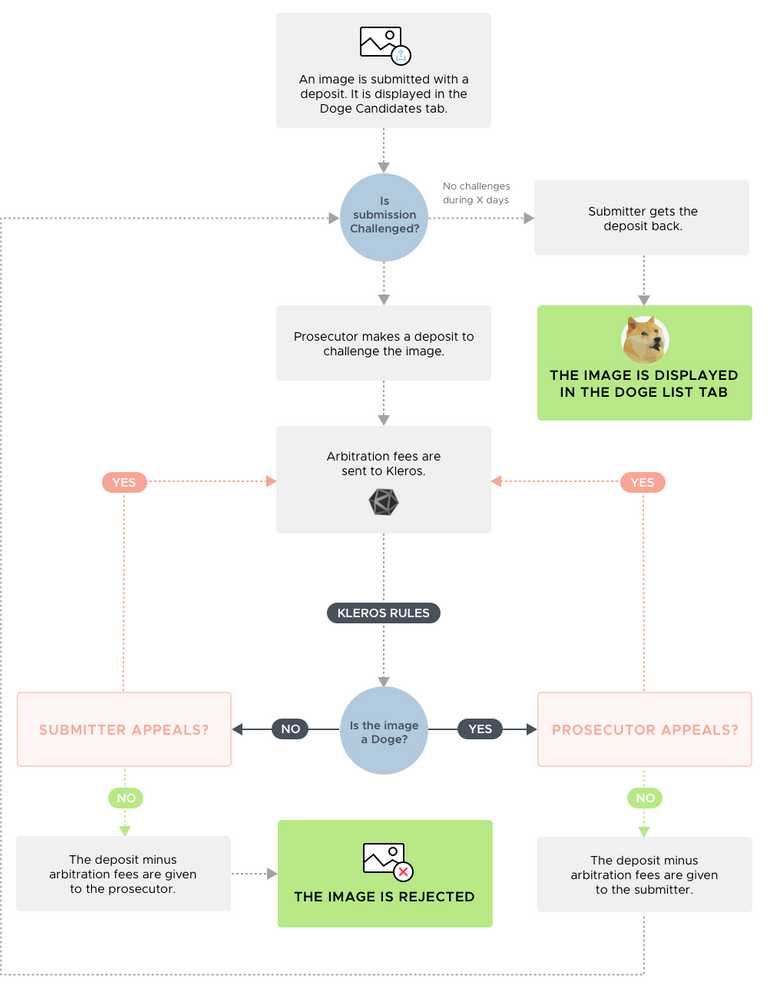Introduction
Nowadays, disputes are part of our daily lives, many of them can be resolved according to their level of complexity with a simple conversation but there are others that can be more complicated and a conversation is not enough, in such cases should resort to a trial or but this measure is very expensive and time consuming.
With the increase in small businesses and especially individuals working independently, there is an increase in disputes which, compared to large companies, are for a relatively low amount of money, which if resolved by a court, the costs of the process would be much greater than the money disputed itself, for these problems there should be a much less expensive solution, but one that is just as reliable and secure, that is where Kleros comes in.
What is Kleros?

Kleros is a decentralized platform based on the Ethereum blockchain that was born with the purpose of solving these dispute problems, this platform is a fast, secure, reliable and efficient problem solving mechanism that offers impartial answers to these problems, this decentralized application acts as an arbitrator making use of intelligent contracts to resolve disputes.
Kleros manages to resolve the disputes by using a select jury specialized in the areas in which the dispute takes place in order to provide a much more accurate and beneficial response for both parties. These jurors are encouraged with tokens when they give a consistent and accurate verdict, however if their decision does not coincide with that of others it will be taken as a poor decision and tokens will be deduced from them.
This is an example of how the jury system of the Kleros platform works:
Within one case there are 5 jurors and after reading and analyzing the case all gave their vote, 4 jurors voted positively while the remaining jury gave a negative vote, in this case the 4 jurors who coincided with the vote will be rewarded with tokens while the other jury will have their tokens reduced, the system acts this way so that the jurors always make consistent decisions and thus guarantee the quality of the jurors and eliminate possible saboteurs.
The resolution mechanism of Kleros is composed of subcourts which are defined by categories
After Kleros users create a contract they must indicate:
The number of jurors
Category D Contract
Results
Options for Juries: at the time of a case the contracts will specify the different options that jurors must choose in the event that one of the parties breaches the contract, for example:
extension of time to complete a task, refund money, pay a settlement, etc. After that, it will also be detailed how the contract will be executed once a verdict is issued, whether to deny or accept an extension of time, refund the money or not, etc.
Kleros Incentive System
It is in the best interest of users to serve as jurors because of the financial compensation, jurors receive an arbitration fee after participating in a disputed contract, candidates will select themselves to serve as jurors using the PNK (Pinakion) token.
.png)
Kleros Experiement: Live
The Kleros platform has launched an experiment to demonstrate how the platform works, as can be seen in the example the doges are loaded on the website and that way users can question whether or not they really are a doge.

Applications
Kleros is a general and multipurpose system that can be used for a large number of situations, here are some examples of case studies:
Trust: when paying for a good or service within blockchain, the funds could be placed within a smart contract, after receiving the good or service, the buyer can unblock the funds to the seller, in case of any problem, Kleros can be used to either reimburse the buyer or pay the seller.
Insurance: the insured will pay a fee to the insurance company to obtain compensation in case of any event that may occur, the insurer will have to put a security deposit fund, when an event occurs, the insurer can validate it and compensate the insured. In the event that the insurer does not validate the event, a dispute resolution process will occur, if the insured wins the dispute resolution process, the funds from the company's security deposit will be transferred to the insured.
Social Networking: Preventing spam, abuse and scams is a challenge for decentralized social networking, users can report network policy violations and place a security deposit, if the violation is questioned, a dispute resolution process occurs, if it is found that there was no violation, the reporter loses his security deposit to the defendant.
For more information watch this short feature intro:
TEAM


PARTNERS

More Information & Resources:
- Kleros Website
- Kleros Whitepaper
- Kleros Medium
- Kleros Youtube
- Kleros Twitter
- Kleros Github
- Kleros Forum
kleros2018
This post has been submitted for the @OriginalWorks Sponsored Writing Contest!
You can also follow @contestbot to be notified of future contests!